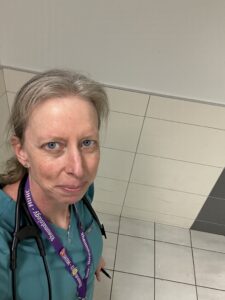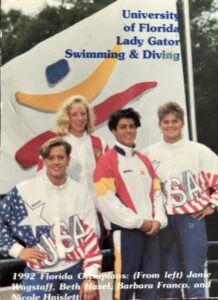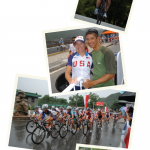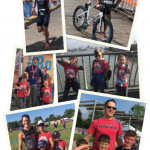Elizabeth Hazel’s hands gripped the starting block in lane one of the outdoor swimming pool in Barcelona, Spain. In just a few minutes, she would realize a childhood dream.
Now a rheumatologist and division site director at McGill University Health Centre, Montreal, Elizabeth Hazel, OLY, MD, CM, FRPCP, competed at the 1992 Summer Olympics in Barcelona. She was 18 years old and hoped to qualify for the final of the 200 meter backstroke. In her heat were seven other women competing against her, each with the same dream. In the lane next to her was a swimmer from Hungary, Krisztina Egerszegi, who held the world record in the 200 meter backstroke.
“Before the race started, I was incredibly nervous,” recalls Dr. Hazel. “But my training had been going really well. I was really excited about how well I was going to do.”
Several seconds later, she heard those famous words: “Take your marks.” The stadium grew silent, waiting to hear the starting signal. BEEP!
Her legs pushed her body hard off the pool wall. And so began her first—and last—Olympic race.
Born to Swim
Dr. Hazel was born in London. “I learned to swim really young, when I was 3 years old,” she says. “I took to the water and just loved it.” Her family moved to Montreal when she was 4 years old. The two young girls who lived down the street swam competitively, and their mother suggested Dr. Hazel do the same.
Throughout her childhood, she woke up at 5 a.m. every day to train before school and swam again for several hours in the evening. By the time she finished high school, she was training almost 30 hours each week. But then her swim coach accepted a position at the University of Florida, Gainesville. Dr. Hazel followed him there in 1991.
The Summer Olympic Games were just one year away. She was eager to qualify for the Olympic swim team and represent Canada, so she returned to Montreal for the Olympic trials. To qualify for the Canadian Olympic swim team, she had to be among the two fastest swimmers in her event. She completed the 200 meter backstroke in two minutes 15 seconds, making the team. It was official. She was an Olympic athlete headed for Barcelona.





